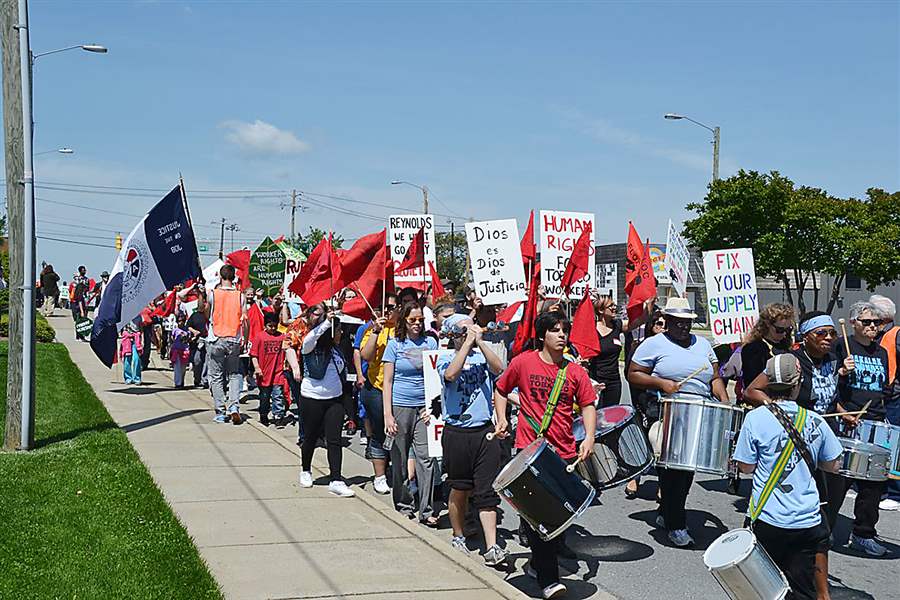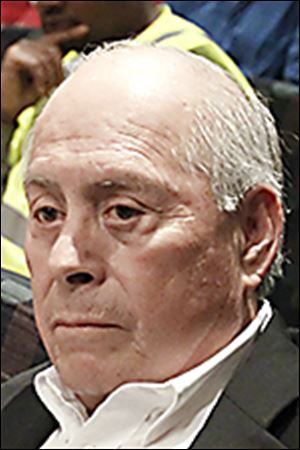
Top tobacco executives set to meet with FLOC
Labor group protested at Reynolds’ meeting
5/11/2013
Members of the Farm Labor Organizing Committee and North Carolina AFL-CIO protest outside the shareholders' meeting of Reynolds American, Inc., in Winston-Salem, N.C.
NORTH CAROLINA STATE AFL-CIO

Members of the Farm Labor Organizing Committee and North Carolina AFL-CIO protest outside the shareholders' meeting of Reynolds American, Inc., in Winston-Salem, N.C.
Top executives for tobacco giant Reynolds American Inc. have agreed to resume discussions with the Toledo-based Farm Labor Organizing Committee about ways to address alleged farm-worker abuses.

Velasquez
Reynolds agreed to resume meeting after the farm-labor union and advocacy group staged a protest Thursday outside the tobacco company’s annual shareholders meeting in Winston-Salem, N.C.
Daan Delen, Reynolds’ president and chief executive, and Mark Holton, the company’s executive vice president and general counsel, are tentatively scheduled to meet next week with FLOC President Baldemar Velasquez officials confirmed.
But both sides seemed less than optimistic about how fruitful the meetings will be.
“It appears that there is some interest on their part,” Mr. Velasquez said, contending he hadn’t heard from Reynolds officials since December. “Whether or not they are sincere about addressing the concerns is another issue.”
Reynolds spokesman David Howard said the two sides haven’t physically met since December but they have communicated by phone and email.
“We’ve had a series of discussions since December,” Mr. Howard said. “They are ongoing and we will continue meeting and having dialogue.”
They couldn’t even agree Friday on how many protesters attended. FLOC estimated its turnout at 400, including 110 people who traveled by bus from Toledo and Cleveland, while Reynolds said there were, at most, 100 people outside its offices. About 60 FLOC members who bought stock in the company were inside.
Mr. Velasquez and other critics say they want Reynolds officials to address several issues, including human trafficking of workers from Mexico and Central America, and numerous human-rights abuses from which they say tobacco-industry laborers frequently suffer.
FLOC’s primary mission is to persuade the tobacco company to support farm workers’ efforts to form a union, Mr. Velasquez said.
Many tobacco farmworkers live in labor camps with inadequate or nonfunctioning toilets or showers and other substandard conditions, Mr. Velasquez said. They also suffer from nicotine poisoning and exposure to dangerous pesticides, he added.
Mr. Velasquez and a contingent of North Carolina ministers and community leaders planned to visit some labor camps Friday evening.
Most problems could be eliminated if Reynolds would allow the farm workers to unionize, Mr. Velasquez said. A union would allow workers to file grievances without fear of retaliation by their employers and allow them to bargain for better wages and working and living conditions.
Mr. Howard said the employees already have the right to join a union — it’s the law in North Carolina. When pressed on the issue, Mr. Howard acknowledged that although workers have the right to join a union, an employer doesn’t have to recognize that representation.
“Well, no, they don’t have to recognize the union,” he said. “But, we can’t do anything about that. Reynolds is not the employer. We cannot negotiate with them because they are not our employees.”
The tobacco company is committed trying to address any problems and welcomes Mr. Velasquez’s input, Mr. Howard said. But Reynolds is limited by what it can do because the company doesn’t employ farm workers or grow its own tobacco; it buys tobacco under purchase contracts with farmers.
Reynolds tries to address problems, Mr. Howard said.
Company officials make periodic inspection visits to farms, he said. All contracted farmers are required to participate in extensive training that defines workers’ safety standards, grievance procedures, and housing standards.
“We’re not blind, there are challenges,” Mr. Howard said. “But progress has been made.”
Contact Federico Martinez at: fmartinez@theblade.com or 419-724-6154.